African healthtech startups are thriving, attracting $550 million in funding over the past three years, even as overall tech investments in Africa dropped by 39% in 2023. This growth is fueled by online pharmacies, telemedicine, and AI-driven diagnostics, with women-led startups securing 31% of funding last year. Here’s a quick look at 11 key investors driving this transformation:
- Villgro Africa: Seed-stage support with grants and equity funding for East African startups.
- Jaza Rift Ventures: Early-stage VC funding ($50K-$500K) for healthtech and medtech.
- IFHA: Growth-stage investments ($5M-$20M) in healthcare infrastructure and services.
- HealthCap Africa: Seed to pre-Series A ($250K-$2M) funding for scalable healthtech solutions.
- i3 Initiative: Pan-African grants ($50K) for startups improving medical supply chains.
- Vital Capital: Large-scale investments ($10M-$30M) in healthcare infrastructure.
- LeapFrog Investments: Growth-stage funding ($10M-$50M) for digital health platforms.
- Health54: Seed to Series B (€250K-€5M) for startups leveraging CFAO’s networks.
- Bill & Melinda Gates Foundation: Grants via i3 to scale impactful healthtech solutions.
- Sanofi: Pharma-focused grants and regulatory support through i3.
- MSD: Flexible funding and supply chain expertise via i3.
Quick Comparison Table
| Investor | Stage & Range | Focus | Regions |
|---|---|---|---|
| Villgro Africa | Seed ($50K-$1M) | Primary healthcare innovations | East Africa |
| Jaza Rift Ventures | Pre-seed to Seed ($50K-$500K) | Healthtech and medtech platforms | East Africa |
| IFHA | Growth ($5M-$20M) | Infrastructure, insurance | Pan-African |
| HealthCap Africa | Seed to Pre-Series A ($250K-$2M) | Scalable healthtech solutions | West Africa |
| i3 Initiative | Seed ($50K grants) | Medical supply chain innovation | Pan-African |
| Vital Capital | Growth ($10M-$30M) | Healthcare infrastructure | Sub-Saharan Africa |
| LeapFrog Investments | Growth ($10M-$50M) | Digital health platforms | Emerging Markets |
| Health54 | Seed to Series B (€250K-€5M) | Digital access, medication, data | Francophone Africa |
| Gates Foundation (i3) | Seed ($50K-$2M grants) | Healthcare access | Pan-African |
| Sanofi (i3) | Seed ($50K-$1M grants) | Pharma logistics | Pan-African |
| MSD (i3) | Seed ($50K-$1M grants) | Pharmaceutical supply chains | Pan-African |
This article explores how these investors are shaping Africa’s $11B e-health market, transforming healthcare access and delivery through targeted funding and expertise.
How USAID Ban is Shaking Up African Healthtech Startups
1. Villgro Africa
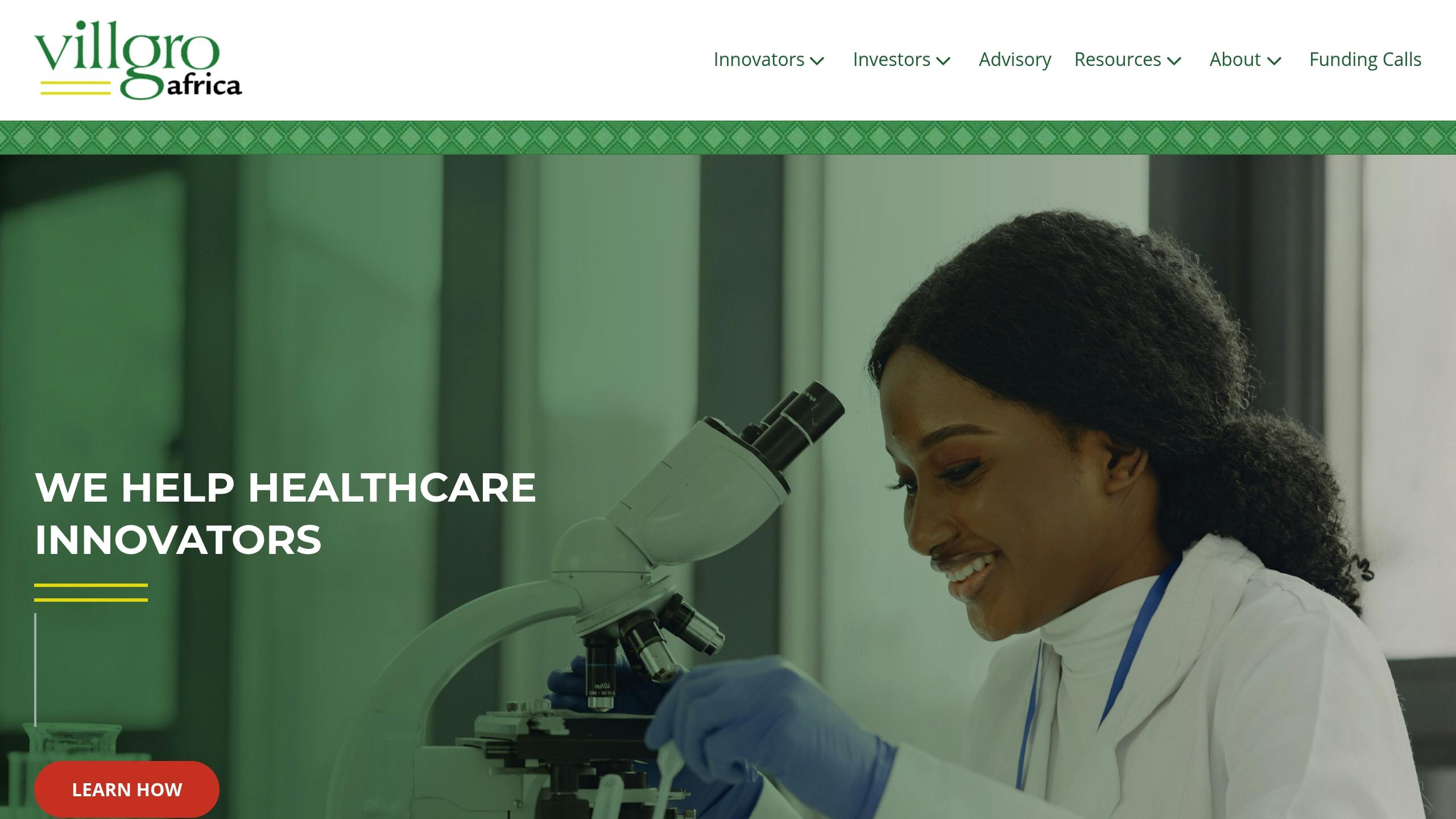
Villgro Africa began in Nairobi in 2015 as part of Villgro India’s franchise network. Since then, it has grown into a key player in healthtech investment and incubation. The organization provides both funding and business development support, having worked with over 40 companies and invested $1.2 million through grants and equity-based funding [2].
Their work focuses on tackling healthcare gaps across Africa. Villgro Africa supports startups in three main ways:
- Funding: Offering grants and equity investments to scale healthtech innovations
- Expert guidance: Providing mentorship for product development and market entry
- Access to networks: Connecting startups with partners, customers, and investors
Their flagship three-year incubation program is a cornerstone of healthtech innovation in East Africa. Companies in their portfolio – such as Dawa Health, BioTec, Swift Lab, and A-Lite [1] – are making strides in diagnostics, medicine access, and healthcare logistics.
"We’re helping to translate knowledge from research into practical impact by offering business processes and know-how", explains Villgro Africa’s leadership [2].
The results are impressive. Villgro Africa has attracted $18 million in foreign investment, improved healthcare access for 10 million people, and boosted local manufacturing through supported startups.
After rebranding in 2020, Villgro Africa expanded its reach across the continent, introducing 3-12 month programs [2]. Its AI for Development initiative now supports innovators in West and Southern Africa [2].
The organization is also addressing systemic issues. For example, it recently joined a consortium aimed at reducing gender disparities in healthcare startup funding [3]. This aligns with 2023’s data showing that 31% of startup funding went to women-led ventures.
2. Jaza Rift Ventures

Jaza Rift Ventures, based in Nairobi, builds on Villgro Africa’s mission but takes a venture capital route to support healthtech innovation. They focus on early-stage funding, investing between $50,000 and $500,000 in pre-seed to seed extension rounds [2].
Their investments center around three main areas:
- Healthtech
- Medtech
- Digital health platforms
By forming strategic partnerships, Jaza Rift ensures its portfolio companies benefit from:
- Access to structured incubation programs
- Guidance from experienced mentors
- Connections across various industries [1]
One standout example of their work is their participation in Zuri Health‘s $1.1 million seed funding round in 2023. This Kenyan digital health startup used the funding to expand its telemedicine platform across several African countries [7].
"We’re enabling the development of advanced healthcare systems and services in Africa through technology-driven solutions", says the leadership at Jaza Rift Ventures [1].
To date, Jaza Rift has made 8 investments [8], targeting scalable projects that deliver measurable improvements in healthcare. Their efforts align with Africa’s growing e-health market, which is projected to reach $11 billion [6].
3. Investment Funds for Health Africa (IFHA)
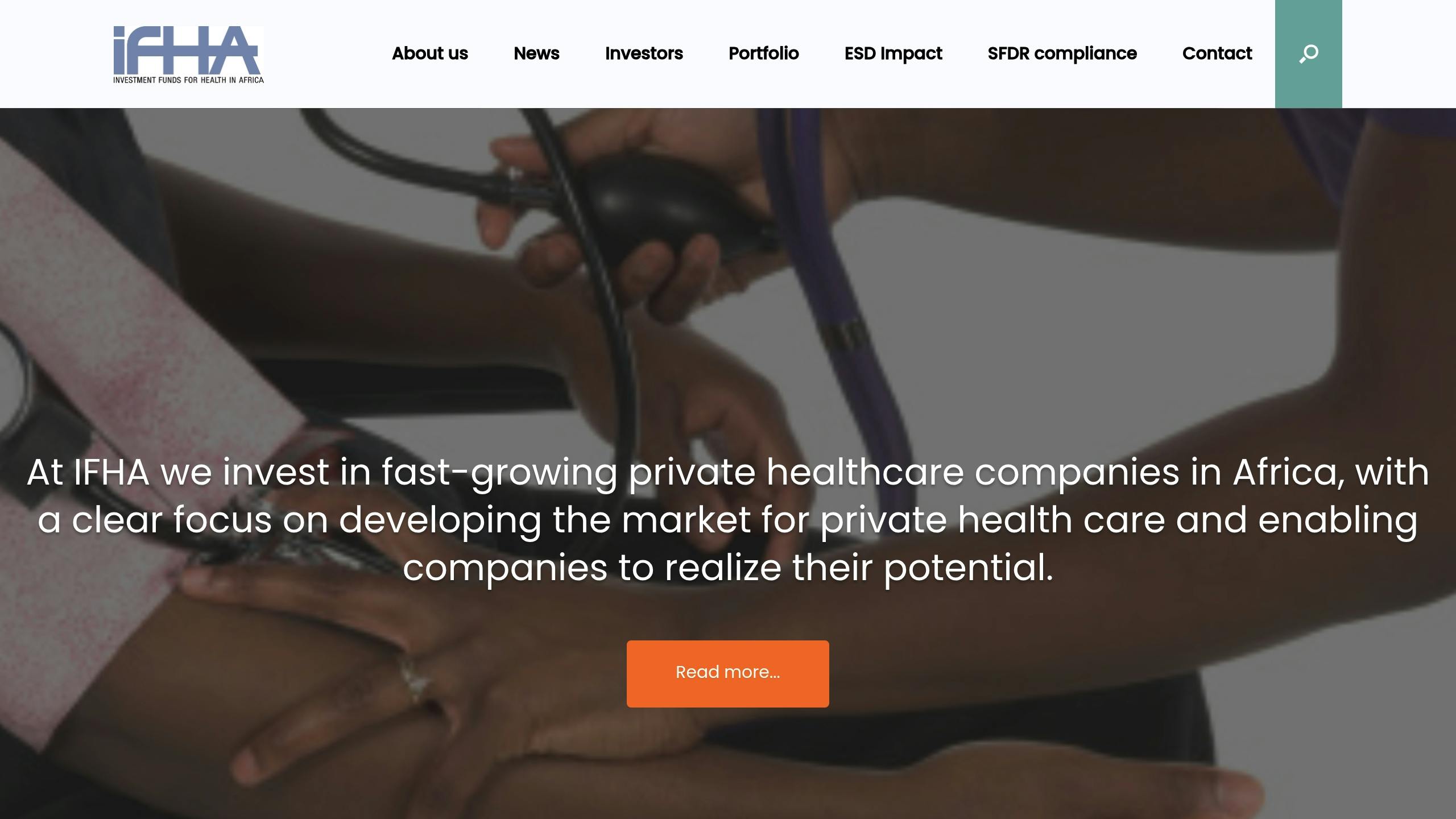
Unlike early-stage investors, IFHA concentrates on established businesses that are ready for growth funding. Since its founding in 2007, IFHA has managed the $167M IFHA-II fund (launched in 2017), with Pfizer committing $15 million as a strategic partner. The fund targets high-growth companies in Sub-Saharan Africa, focusing on sectors like health insurance, pharmaceuticals, medical equipment, and healthcare services [2].
IFHA zeroes in on three main areas within healthcare:
- Primary Care Providers: This includes hospitals, clinics, and telehealth platforms.
- Health Insurance: Specifically, Health Management Organizations (HMOs).
- Supporting Industries: Businesses such as biomedical labs and manufacturers of medical supplies. One example is Pyramid Group, an East African distributor of medical equipment [2].
With investment sizes ranging from $5 million to $20 million, IFHA-II plans to build a portfolio of 12-15 companies [2]. By keeping the portfolio relatively small, they can provide hands-on operational support to their investments. This approach complements the efforts of seed-stage investors while addressing broader needs across the healthcare sector.
IFHA works closely with development finance institutions, tapping into these partnerships to uncover impactful opportunities in Africa’s healthcare landscape [2]. Their focus on improving systemic infrastructure ties in with initiatives like Villgro Africa’s manufacturing efforts and Jaza Rift’s telemedicine projects. By prioritizing investments that combine profitability with better health outcomes, IFHA is meeting the rising demand for quality medical services [2].
4. HealthCap Africa
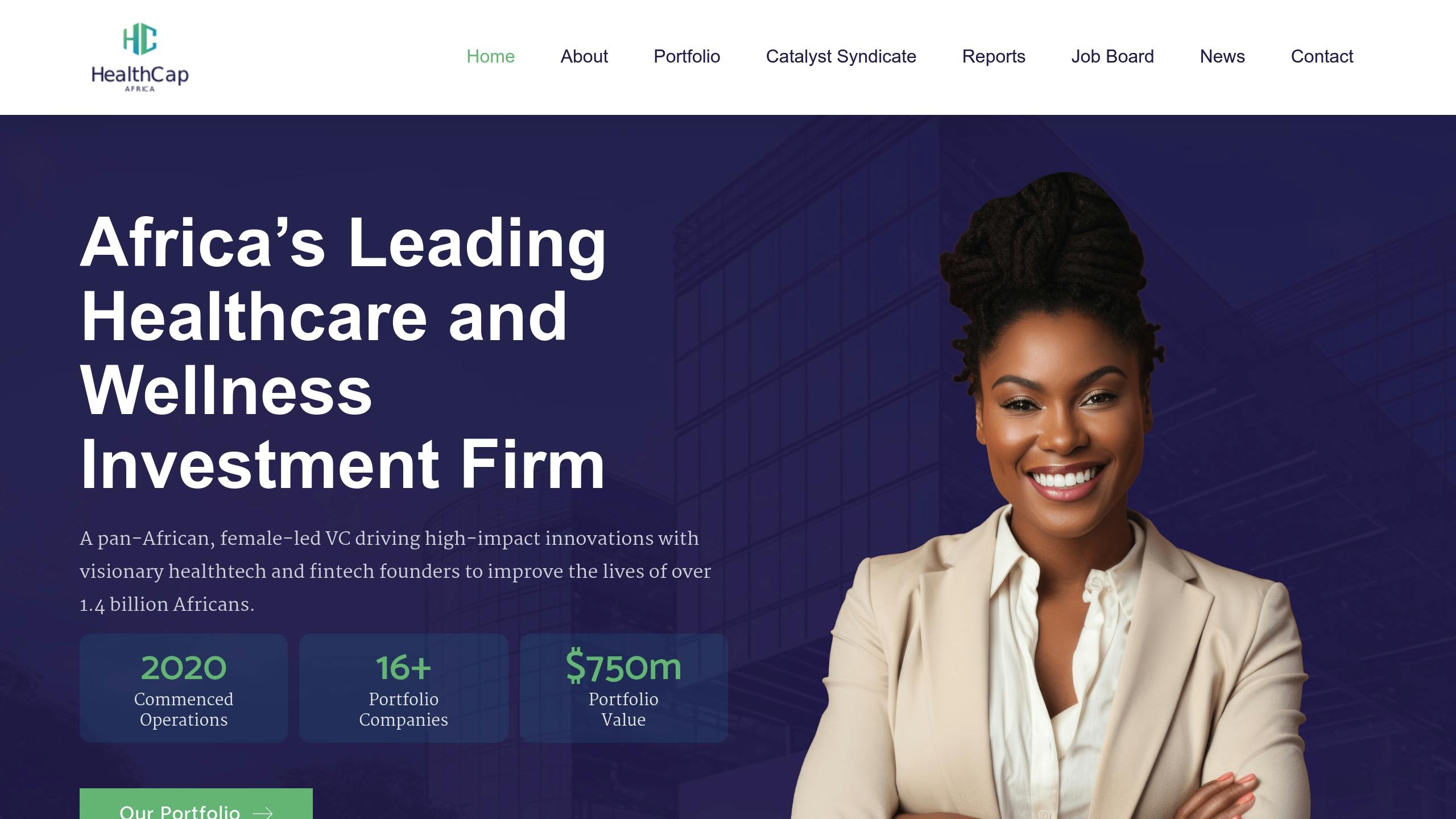
HealthCap Africa steps in to address early-stage funding needs, focusing on Africa’s growing $11B e-health market [6]. The firm specializes in seed and pre-Series A funding, typically investing amounts ranging from $250,000 to $2 million in emerging healthtech startups [6].
Their portfolio highlights some of Africa’s leading healthcare innovations. For example, they’ve backed Helium Health, a top electronic health records (EHR) provider in West Africa, and Lifebank, known for its efficient medical supply distribution [1].
HealthCap Africa operates with a 5-7 year investment timeline [6]. This approach has allowed startups like Helium Health to reach impressive milestones, such as expanding to over 1,200 healthcare facilities [1].
The firm focuses on scalable solutions that address key healthcare challenges, including:
- Medical supply logistics
- Affordable diagnostic tools [5]
- Improving healthcare access in measurable ways
Additionally, HealthCap Africa often collaborates with other venture capital firms, helping its portfolio companies expand and succeed in fragmented markets [6].
5. i3 Initiative (Investing in Innovation Africa)
Launched in 2022, the i3 Initiative is a $7M pan-African program aimed at supporting healthtech startups that are improving medical distribution across the continent [1][2]. By using a consortium-based approach, the program emphasizes collaboration to drive advancements in health technology. In its first year, i3 funded 31 startups [6].
The initiative offers a mix of financial and operational support, including $50,000 grants, technical assistance, market access advice through industry partnerships, and implementation help from consortium partners such as Salient Advisory, SCIDaR, and Southbridge A&I [2].
One notable success story is Nigeria’s DrugStoc, which expanded its product catalog significantly after receiving funding, enabling it to serve 3 million patients [7]. The program focuses on five primary markets: Nigeria, Kenya, Ghana, Uganda, and South Africa [1].
Over the next three years, i3 plans to back 60 companies, aiming to boost the sector through efforts like:
- Improving supply chain systems
- Developing digital health tools
- Enhancing last-mile delivery networks
This consortium-driven model broadens the impact compared to more traditional investment methods.
6. Vital Capital
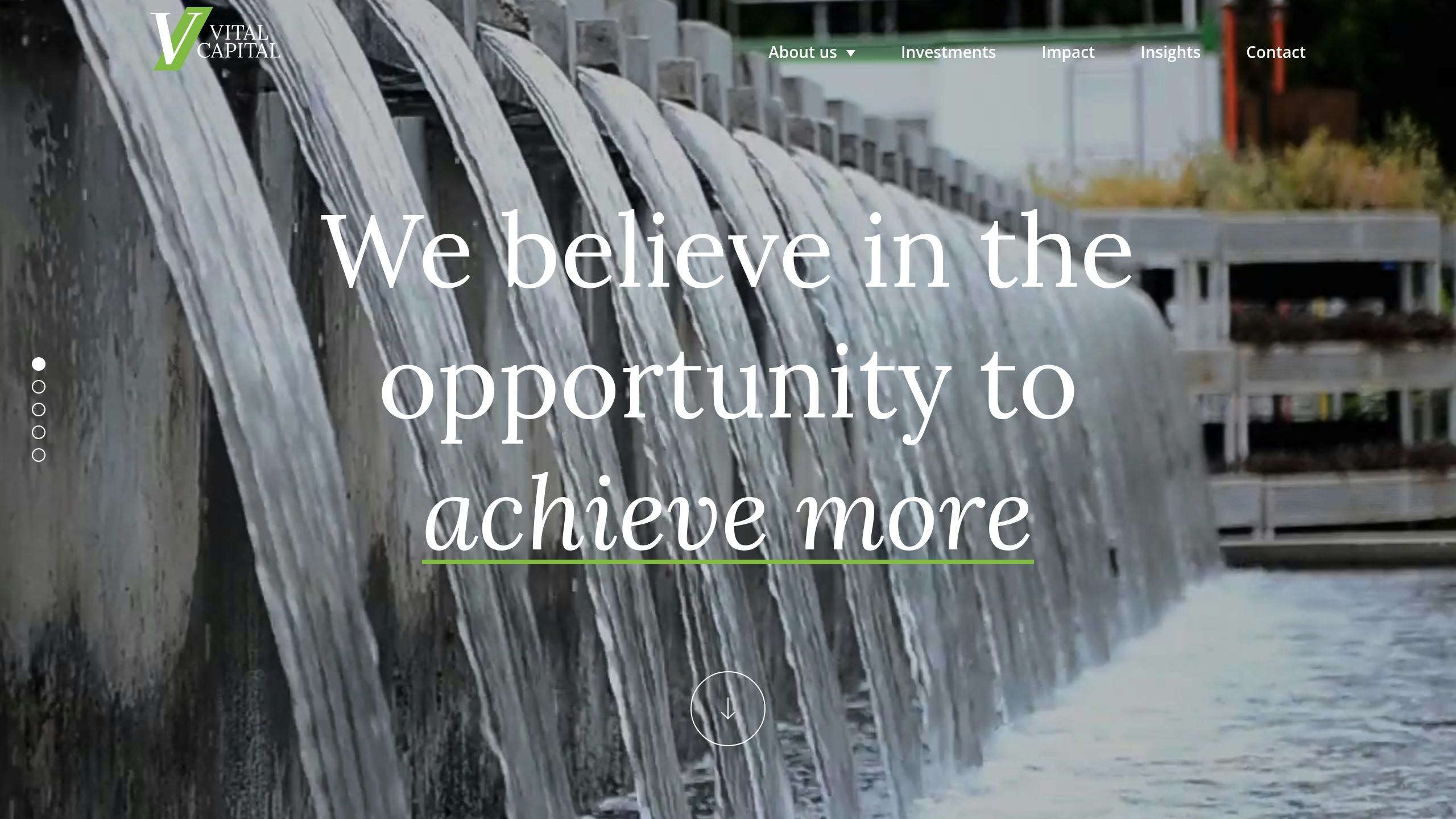
Vital Capital is a firm managing a $350M fund focused on healthcare infrastructure and services across sub-Saharan Africa [2]. They prioritize investments that balance financial returns with meaningful social impact, typically committing $10-30 million per company [1].
Their strategy centers on expanding access to quality healthcare in underserved areas. With investment horizons of 5-7 years, they give portfolio companies the time needed to build effective healthcare solutions and create lasting change [1].
During the COVID-19 pandemic, Vital Capital launched a $10 million debt facility to support healthcare and related sectors in East and Southern Africa [5]. This initiative highlighted their ability to address urgent healthcare challenges without compromising their core investment principles.
By focusing on infrastructure, Vital Capital complements the telehealth and diagnostics initiatives backed by other investors. They track metrics aligned with UN SDGs, such as patient reach, health outcomes, access to services, and job creation. To date, their investments have benefited over 8 million people in sub-Saharan Africa and generated more than 40,000 jobs, both directly and indirectly [2].
While they concentrate on East African markets, they also explore opportunities in West Africa, assessing both technological advancements and local market needs. By participating on boards and offering operational guidance, they help ensure solutions are scalable across multiple countries [1].
sbb-itb-dd089af
7. LeapFrog Investments
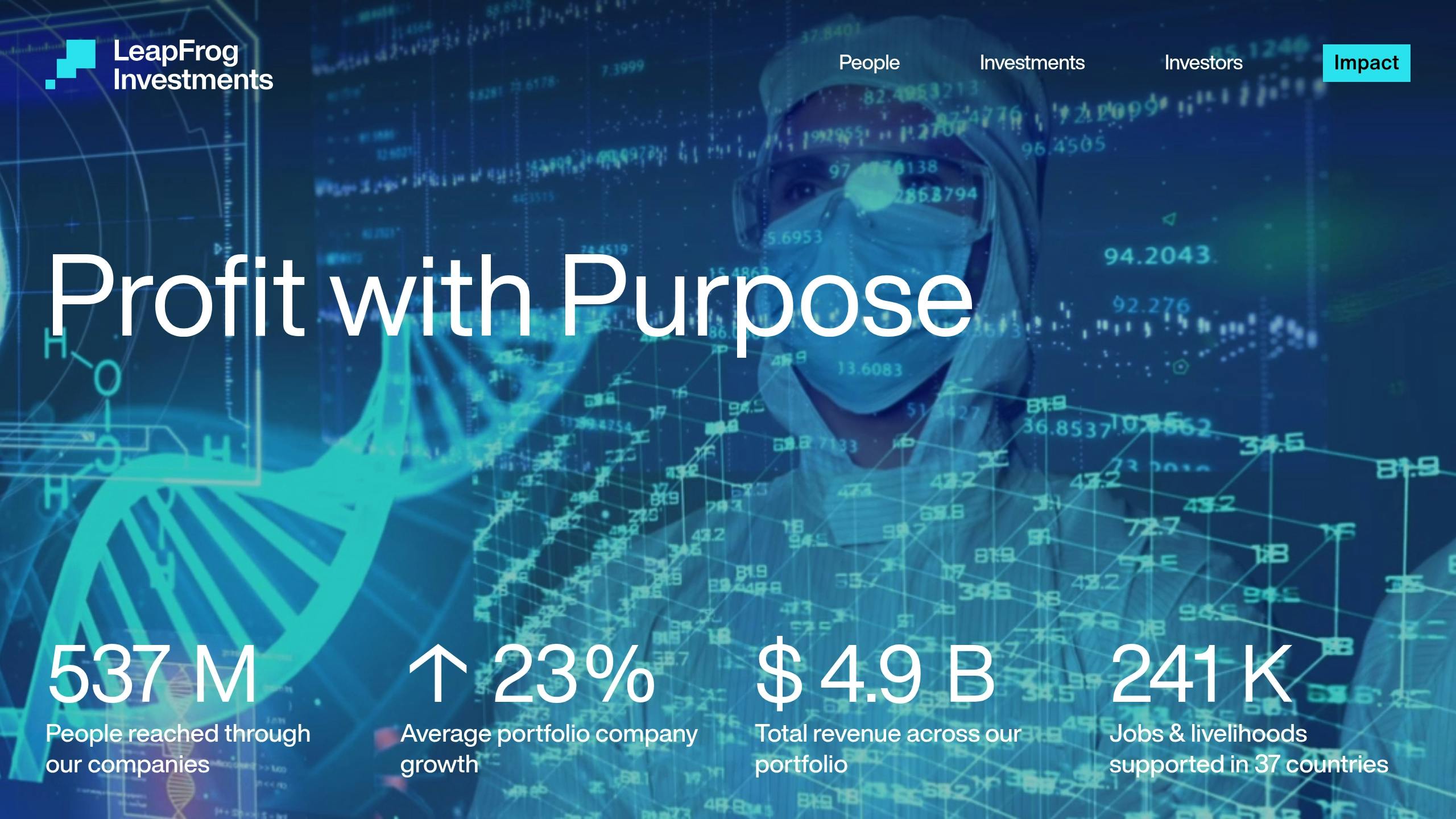
LeapFrog Investments sets its sights on growth-stage healthtech ventures, focusing on businesses that combine healthcare delivery with technology. With over $2 billion raised from global investors, the firm has impacted 272 million people across Africa and other emerging markets [2]. Their investments typically range from $10 million to $50 million, with a goal of reaching 1 million low-income users within five years [1][9].
In Africa, LeapFrog’s healthtech portfolio serves 42 million people through digital platforms [9]. One standout investment is Goodlife Pharmacy, the largest pharmacy chain in East Africa, which blends physical stores with digital health services [1][9].
LeapFrog supports its portfolio companies with a range of resources, including:
- Expert guidance in digital transformation and improving customer experiences
- Access to global networks of industry leaders
- Impact tracking tools to measure both financial and social outcomes
- Strategies for scaling and long-term growth
The firm focuses on digital health platforms, telemedicine, and insurance technologies to tackle Africa’s healthcare challenges. These include limited digital infrastructure and low insurance coverage [1][9]. By forming partnerships with governments and development finance institutions, LeapFrog helps scale solutions across fragmented markets, following models like the i3 Initiative.
This digital-first approach complements other investors’ focus on hospitals and clinics, while also addressing Africa’s massive 83% insurance gap [6]. LeapFrog zeroes in on solutions that improve both healthcare access and affordability, making a meaningful impact across the continent.
8. Health54
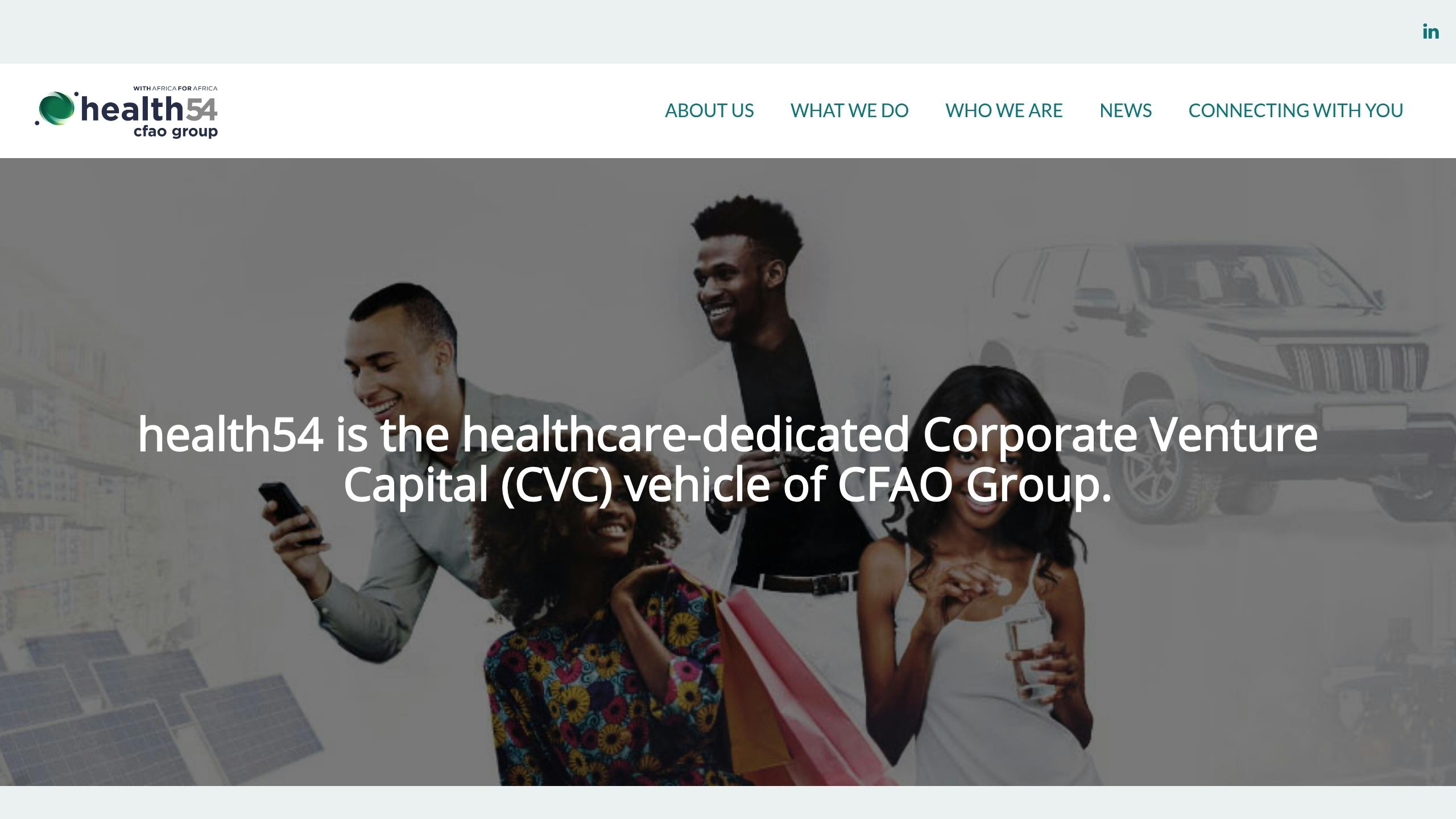
Health54, the venture arm of CFAO Group, focuses on investing in African healthtech startups at stages ranging from Seed to Series B. Backed by Toyota Tsusho, it offers funding between €250,000 and €5 million, leveraging its extensive pan-African networks. This approach, supported by corporate resources, complements initiatives like the i3 Initiative by adding strong distribution capabilities.
Health54 pairs its funding with the CFAO Group’s wide-reaching ecosystem, providing startups with:
- Access to CFAO’s healthcare networks
- Strategic alliances
- Help navigating regulatory challenges
- Expertise in expanding across borders
Its portfolio includes notable names like Nigeria’s Lifestores Healthcare (a pharmacy aggregator), Cameroon’s Healthlane (focused on preventive care), and Mobihealth International, a telemedicine provider. These investments highlight Health54’s commitment to digital solutions that improve healthcare accessibility [1][9].
Health54 focuses on startups tackling four main areas:
| Focus Area | Examples |
|---|---|
| Digital Access | Telemedicine and remote care platforms |
| Medication | E-pharmacy networks and supply chain tech |
| Data Systems | Patient data management systems |
| Prevention | Wellness and preventive care solutions |
By 2025, Health54 aims to build a portfolio of 10-15 companies [5]. It evaluates startups through two key criteria: commercial viability and social impact. Metrics like patient reach and cost reduction are closely monitored, ensuring alignment with other socially driven investors.
Similar to Vital Capital’s focus on physical infrastructure, Health54 uses CFAO’s presence in over 35 countries to help startups scale faster. This operational network enables startups to penetrate markets more effectively than traditional VC support often allows [2].
9. Bill & Melinda Gates Foundation (via i3 Initiative)
The Bill & Melinda Gates Foundation, leveraging the i3 Initiative’s consortium model (see section 5), contributes its global health expertise to strengthen Africa’s healthtech ecosystem alongside corporate partners.
In 2023, i3 expanded its efforts, aiming to support up to 60 African health startups with an $8 million funding pool [7]. This initiative aligns with the Foundation’s broader investments in African healthcare, focusing on solutions that can grow and operate across various markets.
One example is Nigerian pharmaceutical logistics startup Famasi Africa, which used its $50,000 grant to scale its operations [11]. The Foundation emphasizes selecting startups with scalable solutions, sustainable business models, and the potential to create widespread impact across the continent.
10. Sanofi (via i3 Initiative)
Sanofi plays a key role in the i3 consortium, originally established with the Gates Foundation and other partners (see section 5). By contributing its pharmaceutical expertise, Sanofi helps fast-track healthtech solutions. As a founding member, the company offers grants and access to pharma-specific resources, such as its distribution networks and regulatory know-how, to improve medication supply chains and diagnostic tools.
This pharma-led strategy complements the Gates Foundation’s public health efforts within the same initiative (see section 9), forming a well-rounded public-private partnership. Sanofi enhances collaboration across industries through:
- Regulatory guidance tailored to the pharmaceutical sector
- Market access strategies to expand reach
- Mentorship from experienced pharma executives
- Connections to influential healthcare stakeholders [1][4]
This support helps startups tackle scaling challenges while staying locally relevant. It aligns with Health54’s distribution-driven approach (see section 8) but focuses specifically on pharmaceutical supply chains.
11. Merck Sharp & Dohme (MSD) (via i3 Initiative)
Merck Sharp & Dohme (MSD), a key partner in the i3 Initiative alongside Gates and Sanofi (see section 5), works to improve healthcare supply chains across Africa. They contribute by offering risk-tolerant financing and leveraging their expertise in pharmaceutical manufacturing[10]. MSD focuses on supporting both early-stage and growth-stage companies with a legal presence in Africa, prioritizing solutions that can operate across multiple markets[10].
MSD’s funding approach is designed to encourage progress and includes:
- Regulatory support to help navigate complex and fragmented systems
- Flexible funding models that allow for testing new ideas
- Support for scaling operations to prepare businesses for broader market reach
Investment Overview Table
Here’s a quick comparison of key investors, highlighting their focus areas and the type of support they offer:
| Investor | Stage & Range | Regions | Specialization | Support |
|---|---|---|---|---|
| Villgro Africa | Seed to Series A ($50K – $1M) | East Africa | Primary healthcare | Incubation program |
| IFHA | Growth Stage ($10M – $30M) | Pan-African | Healthcare infrastructure | Operational support |
| HealthCap Africa | Seed to Series B ($500K – $5M) | West Africa | Biotech | Strategic partnerships |
| i3 Initiative | Seed to Series A ($50K – $2M) | Pan-African | Tech-enabled healthcare | Corporate partnerships |
| Vital Capital | Growth Stage ($5M – $20M) | Sub-Saharan Africa | Infrastructure | Project management |
| LeapFrog Investments | Growth Stage ($10M – $50M) | Emerging Markets | Digital health | Global network access |
| Health54 | Seed to Series B ($1M – $10M) | Francophone Africa | Digital platforms | Market entry support |
| Gates Foundation (i3) | Seed to Series A ($100K – $2M) | Pan-African | Healthcare access | Technical assistance |
| Sanofi (i3) | Seed to Series A ($50K – $1M) | Pan-African | Medication access | Regulatory guidance |
| MSD (i3) | Seed to Series A ($50K – $1M) | Pan-African | Pharma logistics | Regulatory support |
Looking Ahead
Investment in African healthtech is on a strong upward path, with an expected 25% compound annual growth rate (CAGR) through 2025 [1][9]. This surge is fueled by the increasing adoption of digital health solutions, especially in the wake of the pandemic. This trend aligns with investor priorities, as seen in initiatives like Villgro’s work with AI and i3’s expansive reach across Africa.
Here are three key areas driving investor interest:
- Strategic Partnerships: Collaborating with established healthcare providers and telecom companies has become essential for scaling. For instance, 54gene’s $25M Series B funding was supported by such alliances [1][9].
- Regulatory Compliance: Startups must prioritize strong data governance and stay ahead of changing healthcare regulations. Investors are leaning toward companies that demonstrate solid compliance practices [2].
- Impact Metrics: Investors increasingly value startups that go beyond profits by tracking measurable improvements in healthcare access and affordability [2][3].
The investment landscape is also broadening. Corporate venture arms, impact investors, and government-backed funds are joining traditional venture capital firms [1][3]. This creates openings in areas like telemedicine, health insurance technology, and medical supply chain solutions [1][2].
Specialized funds are expected to focus on AI-driven solutions tailored to local challenges. Models like i3’s collaborations with corporate and pharmaceutical partners provide a framework for scaling these innovations across the continent.
Related Blog Posts
- 10 African Tech Investors to Watch in 2025
- Top 5 Startups to Watch in South Africa in 2025
- How Mobile Health Improves Telemedicine Access in Africa
- Scaling Mobile Telemedicine: Lessons from African Startups





